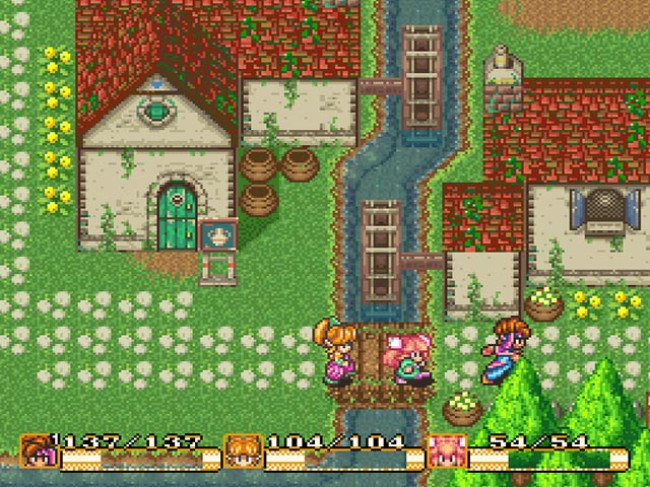

Perhaps part of this dilemma is that the story does little to detract from the crude gameplay—precisely because there's so little story in the first place. Secret of Mana is a simplistic, by-the-numbers hero's journey where the bad guys are really bad and the good guys are really good. There are a couple of interesting bits here and there (like the mana fortress destroying the ecology to stay afloat) but in the end the game pales in comparison to peers like Final Fantasy and Chrono Trigger. If there's a reason you keep playing the game, the plot will assuredly not be it.
What it might be, however, is the game's charming music. Secret of Mana is host to a bevvy of uplifting and energizing tracks, as well as some more thoughtful, melancholy pieces. I'd be remiss if I didn't mention that it has one of the most unique and electrifying final boss themes, that makes up for the relatively lackluster fight. And even if you're not blown away by the score, the sprite work and animations are fairly impressive. Areas are lively and elaborate, and the massive bosses are vibrant and sometimes—to their chagrin—adorable.
But the combat... good golly the combat. I praised the menu wheel for being a novel addition to the game, but it's cumbersome to navigate for single spells, meaning you probably won't be using them all that much. And when you do opt to dispose of a magically vulnerable foe, the rest of the party is forced to watch in stunned silence as the attack goes off... and occasionally misses due to invulnerability frames with no tell. This will happen every now and then for your spells, but your physical attacks are prone to whiffing. It'll get exhausting watching your fully charged-up attack ineffectually pass over an enemy, especially since the longer attack animations don't translate to, well, longer attacks. While there's a sound cue that goes off for a dodge/block/miss/etc, sometimes it won't go off at all and you'll be left wondering what you did wrong. I feel that it's a major failing of an action RPG to have such loose and slippery action.
The most creative part of the gameplay is that using spells from within a certain magic school will level that school up. So the more you heal, the stronger you healing becomes, which technically helps to diversify your spell list since you'll want at least a couple of strong elemental attacks. But like Final Fantasy II, this only works in theory, as your underleveled (and new!) spells will do such pitiful damage that they won't be worth the mana to cast (unless you're grinding). The weapon system works the same way, so you're likely to see the same attacks over and over unless you want to double your playtime diversifying.
And it's not like you'll need to either. Secret of Mana is far from being a difficult game, so long as your equipment is up to snuff. When it's not, bosses will steamroll over you hilariously fast (enjoy being pinned down by the tiger boss). With proper gear most battles are a cakewalk, and even when foes put up a fight, there's usually a spell that'll keep them stun-locked. Some duels can go on forever when you haven't leveled the boss's weakness (ugh the slime dude) but carrying a stock of walnuts ensures you have enough mana to burn through the opposition. At the end of the game I was skipping nearly every enemy, realizing they're less of a threat and more of a mana sink on the way to the boss. And it's always a bad sign when you want to spend as little time as possible interacting with the game's combat system.

I remember liking Secret of Mana as a kid. It was fun spending time in the crystal forest and the desert, nodding my head along to the sweet music as I gradually leveled Salamando. But coming at it as an adult, it's just so... bare-bones and unrefined. You get more personality from the sprites of the characters than you do the writing, and fighting enemies often feels like throwing blunt darts at a dart board. Secret of Mana has an amazing shell that showcases Square Soft at their best, but the yolk has turned more sour than I expected.
---------------------
Images obtained from: blazingcariboustudios.com, nepascene.com, rantingaboutgames.com, geeksundergrace.com







